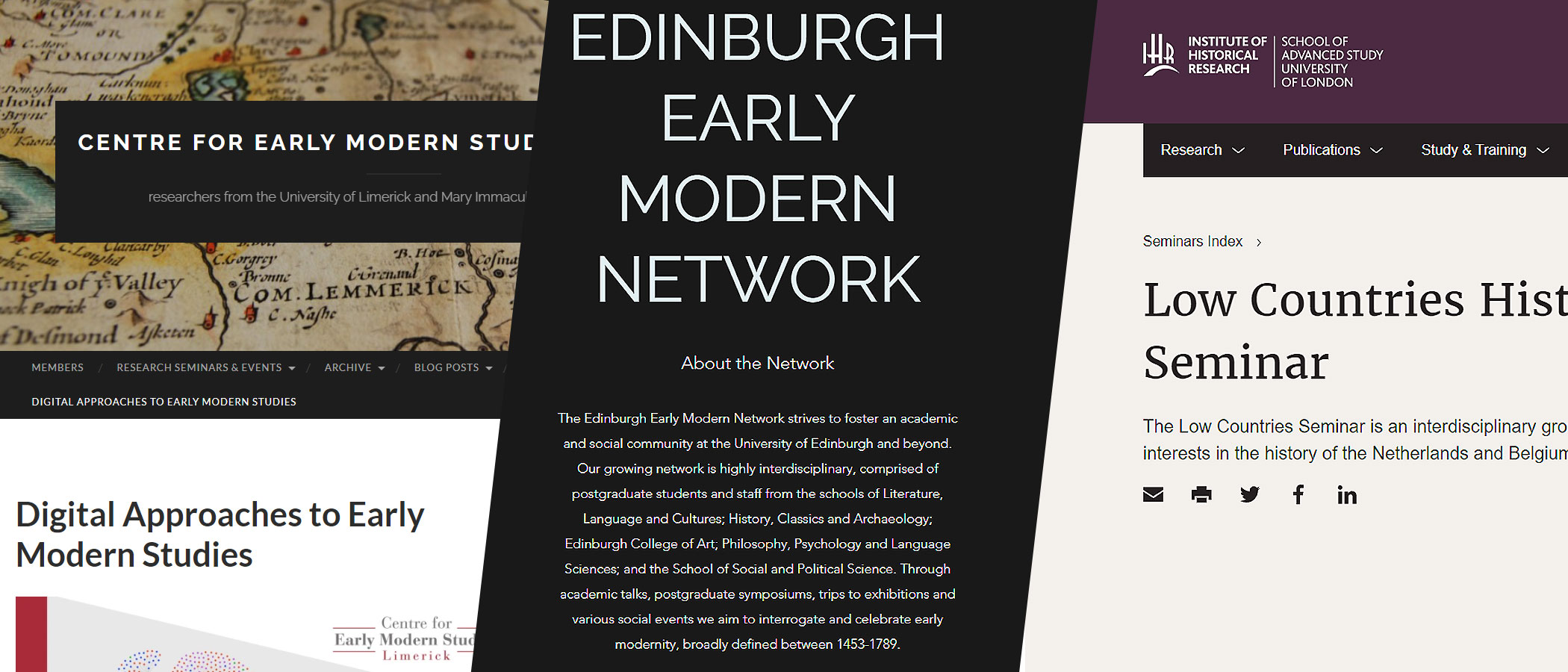Here are the programs from some of the significant academic organizations and participants in the #RenTwitter and #EarlyModern communities on Twitter. If you know of more, please contact me, and I’ll add them to this list!
Contents
Low Countries History Seminar
From the Institute of Historical Research at the University of London, the seminar series is “is an interdisciplinary group with wide-ranging interests in the history of the Netherlands and Belgium. We include historians of art and literature as well as ‘straight’ historians, and are welcoming to students and the general public as well as scholars. The topics of the papers we hear range chronologically from the Middle Ages to the present, with a majority focusing on the Golden Ages of Flanders and Holland in the early modern era.”
Given the topical focus on this seminar series, I’m generally pretty interest in the talks they organize!
Spring 2021 Lectures from the Low Countries History Seminar:
- 19 Feb 2021: The Counts of Flanders, the Towns, and England. Patterns of Diplomatic Competition and Complementarity in Times of Revolt (14th–16th centuries)
- 5 March 2021: Economies of Knowledge. The Epistemic Cultures in the Dutch East India Company (1602–c. 1650)
- 19 March 2021: The Dutch Hat Makers of Medieval London
Digital Approaches to Early Modern Studies Symposium Series
This is a symposium series put on by the Centre for Early Modern Studies, Limerick (from both the University of Limerick and Mary Immaculate College, Limerick). The series of four events looks to feature a wealth of great talks around the digital humanities.
Each symposium will have a set of three thirty minute talks. Should be interesting.
Digital Approaches to Early Modern Studies Schedule:
9 Feb 2021: Network and Circulation Analysis and Visualisation
- Ingeborg van Vugt (Utrecht): What’s in a network metric? Insights from the seventeenth-century Republic of Letters
- Kaspar Gubler (Bern): The reconstruction of knowledge networks: Data model and visualisations of the project Repertorium Academicum Germanicum (RAG)
- Evan Bourke (Maynooth): Networking literary patronage in Gaelic Ireland 1550-1650
3 March 2021: Digital Analysis of Text
https://tinyurl.com/CEMS3March
- Katie McDonough (Alan Turing Institute): Where is the Enlightenment? Space and geography in Diderot and d’Alembert’s Encyclopédie
- Paty Murrieta-Flores (Lancaster): Old sources, new technologies: Computational approaches to the analysis of sixteenth-century Mexican historical sources
- Huw Jones (Cambridge University Library): Text and image: The International Interoperable Image Framework and the digital edition
7 April 2021: Databases
https://tinyurl.com/CEMS7April
- Valeria Vitale (British Library/Pelagios Commons): Ancient maps and digital gazetteers: Annotating historical documents with Recogito
- James Kelly (Durham): Early modern monks and nuns in the digital age: Creating searchable prosopographical databases of exile English religious and why it matters
- Graeme Kemp (St Andrews): The Universal Short Title Catalogue. The past, present and future of a bibliographical database
5 May 2021: Geographic Information Systems
- Bart Holterman (Göttingen): Roads, nodes and rivers – mapping the premodern street network
- Keith Lilley (Belfast): An ethnography of cartography: tracing Early Modern maps and map-makers through geospatial technologies
- Catherine Porter (Limerick): The mapping of Early Modern Ireland: a digital approach for understanding early survey
The Edinburgh Early Modern Network Spring Schedule
This is an academic peer network focused on students, academics, and researchers in Scotland and the north of England focused around the University of Edinburgh. As they describe themselves, “through academic talks, postgraduate symposiums, trips to exhibitions and various social events we aim to interrogate and celebrate early modernity, broadly defined between 1453-1789.”
While their focus appears to be on the academic community of early modernists in the area, they’re hosting a full suite of interesting online programming this Spring that may interest you.
However, they appear to have a number of online locations, so I’ll let you browse them to see what raises your interest:
- Eventbrite: https://www.eventbrite.co.uk/o/edinburgh-early-modern-network-31222307897
- Homepage: https://edearlymodernnetwork.wixsite.com/ednetwork
- WordPress Blog: https://earlymodernnetwork.wordpress.com/
Also note the interesting content for those interested in gender and LGBT+ studies!

Leave a Reply